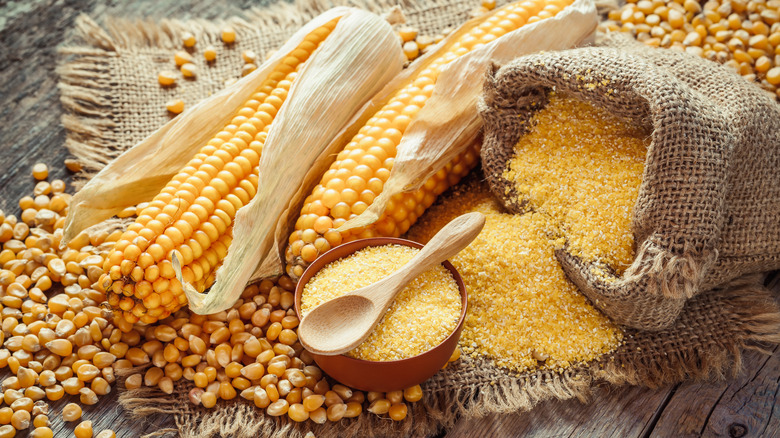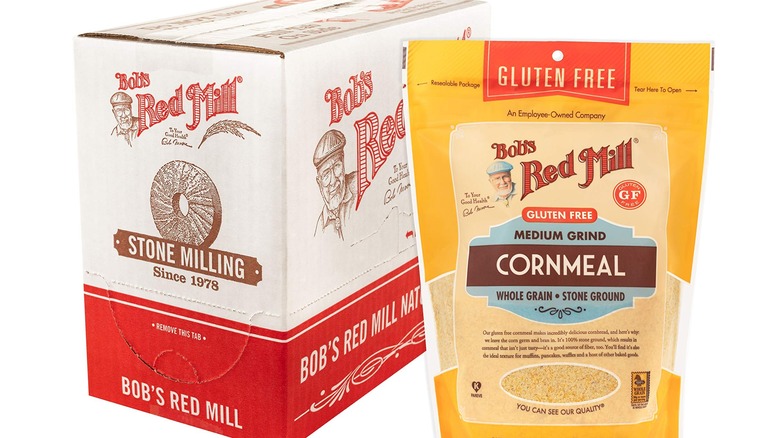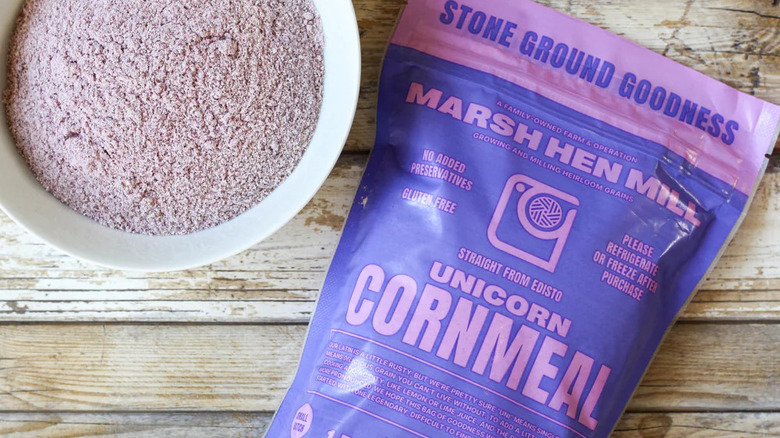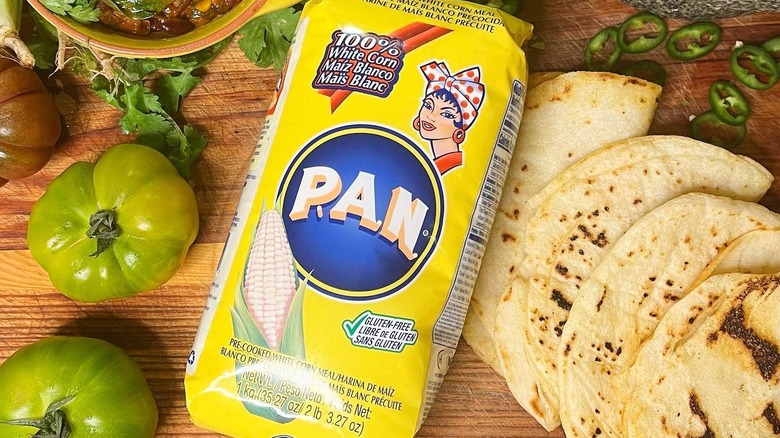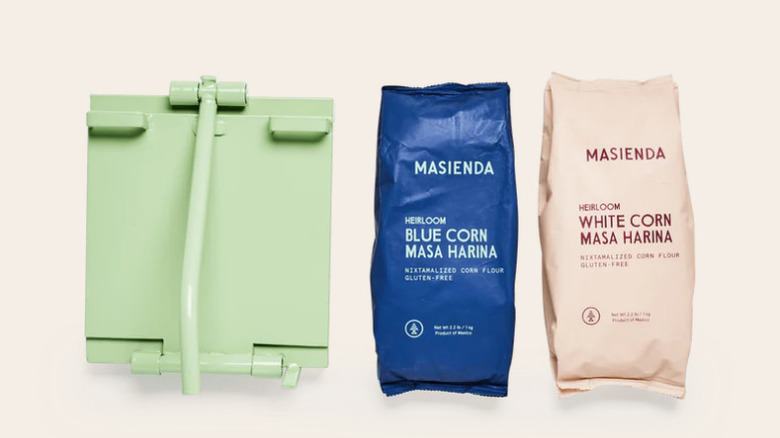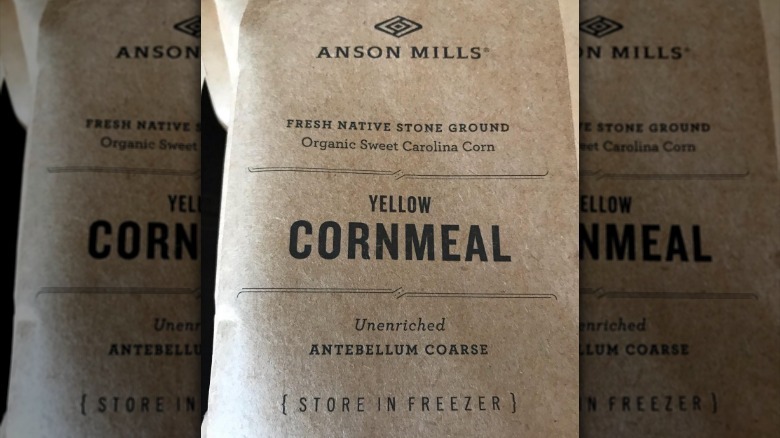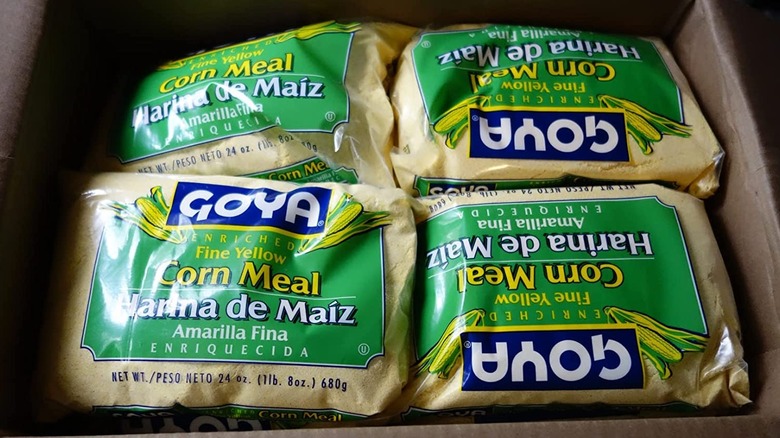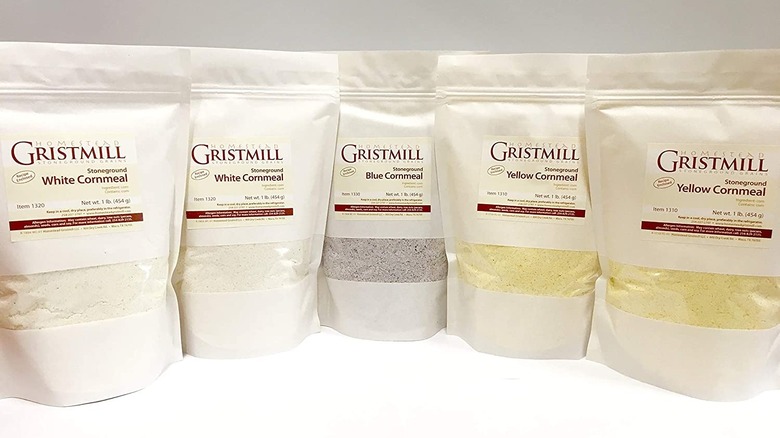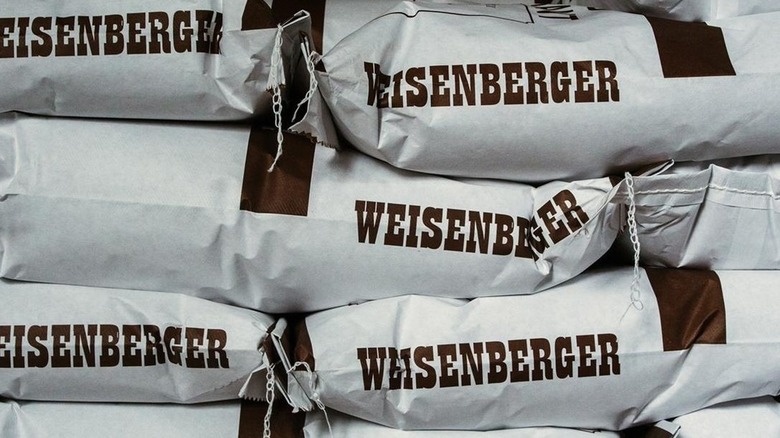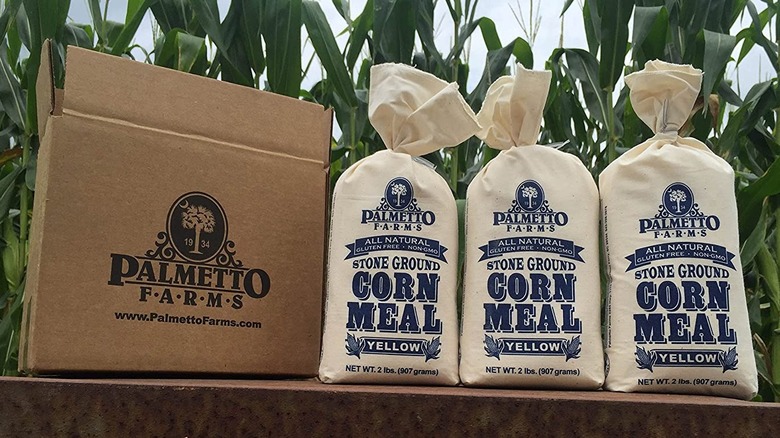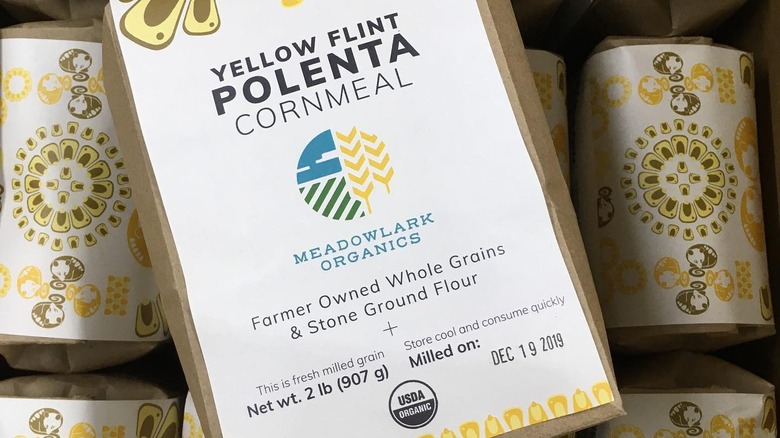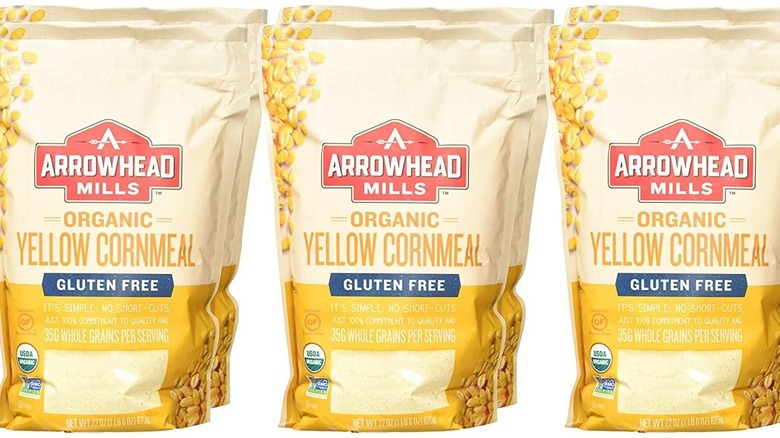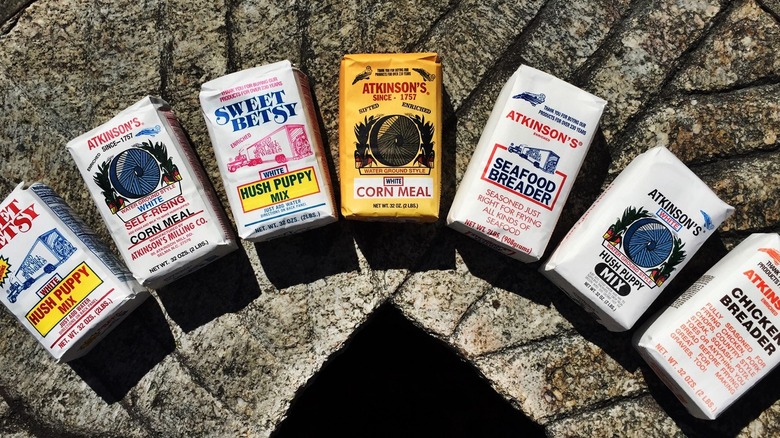The 12 Best Cornmeal Brands You Need To Start Cooking With
We may receive a commission on purchases made from links.
As one of the earliest staple foods in the Americas, cornmeal has been a culinary cornerstone for thousands of years. Considered sacred — as well as essential — to the Indigenous communities who first cultivated corn, cornmeal took on a similar significance for the first European settlers who would have likely starved without it.
Corn's history became international after colonizers brought it across the Atlantic in the 1500s through the Columbian Exchange. Adopted into the cuisines of numerous cultures, corn and cornmeal's versatility has woven this grain into many nations' culinary identities and histories. The primary component of dishes such as Romanian Mamaliga, West African Akasa, Central American pupusas, and Caribbean Cou-Cou, cornmeal is a diverse ingredient that can be boiled and baked into infinite forms of comfort food. White, yellow, red, or blue, whether you're looking to fry up a crisp tortilla or bake moist cornbread, here are some of the best cornmeal brands you need to start cooking with to transform an unassuming ingredient into the most delicious, nutritious, and eye-catching recipes.
1. Bob's Red Mill
If you're looking for an all-purpose option, Bob's Red Mill Gluten-Free and Medium Grind Cornmeal is a versatile choice suitable for baking and breading. Produced in a dedicated facility, this brand is also allergen-friendly and readily available in most grocery stores.
Bob's Red Mill grinds its cornmeal by the ancient practice of stone milling, which leaves its grains intact. During the milling process, other commercial mills remove the germ and bran (nutrient-rich parts of the grain) from corn products, which is why many cornmeal brands might be labeled as "degerminated." This is a common practice because it improves grain texture and shelf life — the germ has a high oil content, which means whole-grain cornmeal is likelier to go rancid. But removing these parts of the grain also eliminates the fiber, antioxidants, and B vitamins that give the grains a rich source of nutrients. For longer shelf life, the Global Cold Chain Alliance suggests storing whole-grain cornmeal in the refrigerator. It's worth the extra effort because whole-grain cornmeal boasts more flavor and nutritional value. Bob's Red Mill cornmeal is flavorful, 100% whole grain, and high in fiber. (P.S. It would be great in this gluten-free cornbread).
2. Marsh Hen Mill
If you're in the mood for something creative, try Marsh Hen Mill's Unicorn Corn Meal. Produced from red corn, it's naturally pink and creamy. If you don't mind falling abreast of the Millennial pink trend, unicorn corn meal rivals red-velvet with a subdued pastel color, resulting in unique pale pink confections. For an even more enhanced color, Marsh Hen's site suggests adding a splash of something acidic — like lemon juice — to further jazz up the recipe. (If you're more into blues, you might prefer the Sea Island Blue Corn Meal for an equally colorful touch).
Based on Edisto Island, Marsh Hen Mill sources its cornmeal from local growers. Its stone grinding technique churns out artisanal grains that are sweeter than supermarket varieties. "You'd swear I put a cup of sugar in it," co-founder Greg Johnsman told The Washington Post. Marsh Hen Mill's cornmeal has a finer and flour-like consistency – making it ideal for baking. The company's products are found in upscale restaurants throughout South Carolina but are also in national grocery stores like Whole Foods. Marsh Hen Mill's corn meal should also be refrigerated.
3. P.A.N.
If you're seeking something for traditional Latin-American dishes, P.A.N. Pre-Cooked Corn Meal is a versatile, shelf-stable choice. P.A.N. is prevalent in Latin American marketsand available in the international aisle of most supermarket chains.
Pre-cooked cornmeal (also called Masa Harina) involves cooking dried maize kernels in an alkaline solution (usually limewater) through nixtamalization. This cooking process gives the cornmeal an intense flavor, increasing the nutritional content of the grain by enhancing its ability to absorb vitamins and minerals. Also, it ensures the product will have a longer shelf life.
Nixtamalization improves cornmeal's binding ability, which is why P.A.N.'s pre-cooked cornmeal is ideal for making corn flatbreads. Well-suited for frying, the soft dough cooks into that perfect texture – crispy on the outside but still soft on the inside. P.A.N. cornmeal is convenient to use, transforming into an adaptable dough after simply adding water. Both the white and yellow cornmeal varieties will have you whipping up authentic tortillas and classic arepas in minutes.
4. Masienda
For a taste of true, ancient flavor, Masienda's Blue Corn Masa Harina is another colorful, nutritious choice. Blue corn, native to Mexico and the southwestern region of the United States, is an integral element of Hopi Native American cuisine and culture. The tribe's origin story states that among the gifts from the Guardian Spirit Màasaw was an ear of blue corn. While it is exceptional for its striking blueish-purple hue, blue corn also contains more protein than yellow corn, and is full of antioxidants from the anthocyanins that give the corn its distinctive color.
Searching for the perfect tortilla, Masienda's founder Jorge Gaviria traced the secret ingredient back to the heirloom corn of Oaxaca, Mexico. The corn is grown using traditional regenerative farming practices, resulting in flavorful, nutrient-rich grains. Milled in small batches, Masienda's Blue Corn Masa Harina is also nixtamalized, lending it that superior binding quality ideal for making tortillas. This blue cornmeal also produces delicious baked goods — try using it to make vibrant cornbread or blue corn pancakes.
5. Anson Mills
If you're in the market for something authentic, try Anson Mills Antebellum Fine Yellow Cornmeal. The cornmeal is top-rated by America's Test Kitchen and produces moist baked goods and unparalleled cornbread. Though this brand may not be the easiest to find, Anson Mills' commitment to historic and sustainable milling processes makes this cornmeal worth seeking out.
Based in South Carolina, Anson Mills uses the traditional farming approach of crop sequestration and rotation, an homage to the region's historic farming practices and a nod to regenerative techniques that will ensure bountiful future harvests. To revive the flavors of the South, founder Glenn Roberts went on a quest for the corn whose superior flavor defined Antebellum cuisine and gave Southern cornbread its renown. He tracked down a strain known as Carolina Gourdseed White, an heirloom variety popular in the South before the Civil War – though Native Americans were growing this corn well before colonists arrived in America.
Since then, Anson Mills has expanded to revive other rare and nearly extinct varieties of Southern mill corn. The brand revitalizes the flavors of the region's history to produce a taste you can't find anywhere else. Available in some Whole Foods, you can also order Anson Mills products directly from its website and select online retailers. Due to its traditional stone-milling technique, Anson Mills recommends treating its cornmeal as a perishable product. After purchasing, keep the cornmeal in the fridge or freezer.
6. Goya
If you're looking for a pantry staple, Goya Enriched Fine Yellow Cornmeal is another good choice for traditional Latin dishes. A gateway into Latin American cuisine as a popular American brand, Goya is available in most grocery stores nationwide. As an enriched grain, Goya's cornmeal is milled more commercially, requiring the iron and B vitamins stripped during processing to be added back into the grain. This process gives Goya cornmeal a longer shelf life, as it does not require refrigeration, making this a good brand to keep on hand.
Founded in 1936 by Spanish immigrants Carolina and Don Prudencio Unanue, Goya seeks to make readily available the flavors of Spain, Mexico, and the Caribbean, as well as Central and South America. While ideal for preparing dishes with Latin roots, Goya cornmeal's versatility also makes it equally adaptable for baking as well as thickening soups and stews. America's Test Kitchen also rated it the best supermarket brand if you just want to whip up a quick and simple batch of cornbread.
7. Homestead Gristmill
If you're eager to cook with something natural and non-GMO, Homestead Gristmill's Stone-Ground Cornmeal is another brand that emphasizes traditional milling techniques for optimum flavor and nutritional value. Based in central Texas, Homestead Gristmill grinds its cornmeal in a restored, water-powered gristmill that dates back to the 18th century. The company is named after the machinery that produces its chemical-free products. Homestead Gristmill gets its grains from local farms to uphold the brand's farm-to-table values.
The grist mill was introduced to the Americas in the 1600s and uses water from a running source to power a wheel that moves the heavy stones. These stones grind the grains into meal and flour, preserving the nutrition content in the process. "Grist" is just another word for these grains. "We're not going back to the primitive," manager Kash Nathan said of the milling process in Episode 2 on Homestead Gristmill's YouTube channel, "but we're trying to keep what works."
8. Weisenberger Mill
If you're planning to buy in bulk, Weisenberger Mill's Southern White Cornmeal is a trusted choice from a family company owned and operated for six generations. The oldest commercial mill in Kentucky, Weisenberger Mill produces cornmeal that is a reliable option for breading and baking to cook up everything from hushpuppies to fried chicken. As the "baker's choice" of the Bluegrass, per What Chefs Want!, the mill grinds an array of textures, offering both bolted and unbolted cornmeal for either a more coarse or finely-ground consistency.
"Bolting" refers to the way cornmeal is processed — the grains undergo a series of siftings or boltings, which remove some of the nutrient-dense germ of the grain. Unbolted cornmeal, on the other hand, does not go through this sifting process, and therefore produces a whole grain product. The Washington Post recommends keeping unbolted cornmeal in the fridge to maximize its shelf life if you won't be using it up fairly quickly.
9. Palmetto Farms
Palmetto Farms Stone Ground cornmeal is an artisan-milled variety that's all about flavor. Founder James Graham started milling for his family and local community in the 1930s simply because he wasn't satisfied with any of the products in stores. "I couldn't find any meal that I liked," he told The Loris Sentinel, saying of his own all-natural, preservative-free cornmeal, "it just tastes better this way." His community agreed with his palate, and now Palmetto Farms corn products, including its stone ground cornmeal, are available in numerous grocery chains nationwide such as Kroger, Trader Joe's, and Whole Foods. Operating three generations strong, Palmetto Farms products are all Non-GMO and most of them are naturally gluten-free. The company recommends using its cornmeal in place of flour for gluten-free alternatives to breaded fish and fried chicken.
Based in South Carolina, Palmetto Farms is in the heart of a region that takes corn seriously (it's been a foundation of the South Carolina diet since colonial times ). Among its corn products, the brand is also renowned for its grits, a coarser version of cornmeal (the name refers to both the ingredient and the dish). Palmetto Farms' desire to provide "Real Good Grits" upholds the state food and maintains local popularity with a unique, old-fashioned, home-grown flavor that mass-produced brands simply can't achieve.
10. Meadowlark Organics
If you're in the mood for some Italian food but want to branch out from pasta and risotto, reach for your Meadowlark Organics Flint Corn Polenta. Flint corn, or otto file in Italian, is a corn variety first cultivated by Native American tribes in the northeast, which caught on in Italy once brought overseas due to its superior texture when cooked. Since then, flint corn has come to be regarded as the cornmeal that makes for true Italian polenta, and Meadowlark Organics' variety is as true as it gets.
Though you can use any coarse-ground cornmeal to make polenta, Meadowlark Organics flint corn is descended from an heirloom variety with seeds that have been hand-selected, bringing it as close to the original, ancient strain as you might hope to find. Meadowlark cornmeal has a distinctly sweet flavor, which also makes it good for baking.
While the Yellow Flint Corn Polenta is a more traditional ingredient, Meadowlark's Red Corn Polenta became a 2023 Good Food Awards finalist after a blind taste test. If you're not based in Wisconsin, where a few stores carry Meadowlark products, you can order online. The company recommends refrigerating or freezing all its corn products for longer storage.
11. Arrowhead Mills
If you need an organic staple, Arrowhead Mills Organic Gluten Free Cornmeal is a versatile, allergen-friendly choice readily available in many grocery stores. From its humble origins when the company operated out of a converted railroad car in the 1960s, Arrowhead Mills has been a trailblazer of the organic baking industry, growing with the era's demands for environmental awareness and organic industry. The brand has since expanded to become a thriving natural foods wholesaler that champions nutritional and environmental standards. Arrowhead Mills' organic cornmeal further reflects these values in being certified as whole grain and gluten-free.
The brand promotes its products for baking and notes that you can substitute 25% of flour with its cornmeal for an even more sublime texture in baked goods, such as pancakes, muffins, or pizza dough. It can also be used as a breading for fried foods, as it creates a light and crispy texture. Though Arrowhead Mills cornmeal does not specifically require refrigeration, keeping this whole grain cornmeal at a cooler temperature will ensure it stays fresh longer.
12. Atkinson Milling Company
Look no further for a traditional cornmeal brand than Atkinson Milling Company's Stone Ground Cornmeal. Atkinson's mill has been operating continuously since 1757, working with the same technology that churned out cornmeal products before the American Revolution. Corn has defined the mill's success for over 250 years and is ingrained in the operators' identity. Ray Wheeler, who now owns the mill with his wife Betty, is so dedicated to the business that he is known around North Carolina as "The Cornbread Man," a nickname that's officially registered with the state.
Atkinson's cornmeal comes at a reasonable price point and can be easily found online. The brand prides itself in offering quality stone-ground products, and mills a variety of cornmeal textures to suit all preferences. Though it's most famous for fine stone-ground cornmeal, it has an even finer variety for those who don't want any grittiness: The Cattail Corn Meal is as fine as flour and functions just as well, making for especially tender cornbread and delightfully crisp, breaded seafood.
